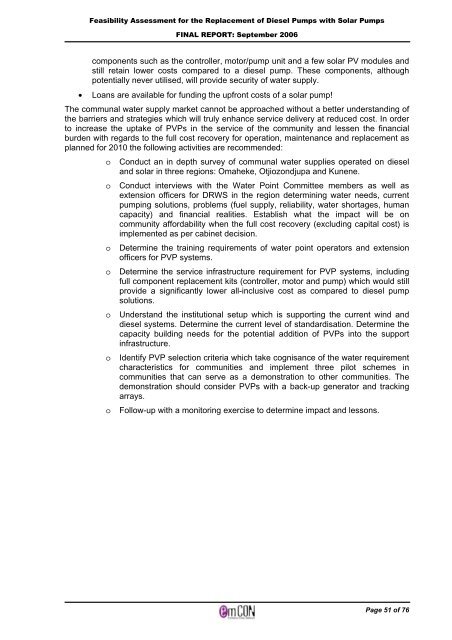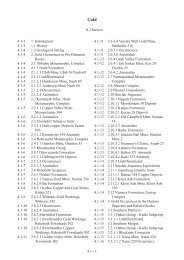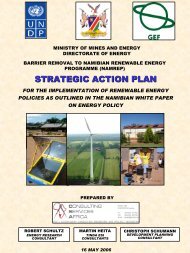Solar PV water pumping study - FINAL REPORT ... - UNDP, Namibia
Solar PV water pumping study - FINAL REPORT ... - UNDP, Namibia
Solar PV water pumping study - FINAL REPORT ... - UNDP, Namibia
Create successful ePaper yourself
Turn your PDF publications into a flip-book with our unique Google optimized e-Paper software.
Feasibility Assessment for the Replacement of Diesel Pumps with <strong>Solar</strong> Pumps<br />
<strong>FINAL</strong> <strong>REPORT</strong>: September 2006<br />
components such as the controller, motor/pump unit and a few solar <strong>PV</strong> modules and<br />
still retain lower costs compared to a diesel pump. These components, although<br />
potentially never utilised, will provide security of <strong>water</strong> supply.<br />
• Loans are available for funding the upfront costs of a solar pump!<br />
The communal <strong>water</strong> supply market cannot be approached without a better understanding of<br />
the barriers and strategies which will truly enhance service delivery at reduced cost. In order<br />
to increase the uptake of <strong>PV</strong>Ps in the service of the community and lessen the financial<br />
burden with regards to the full cost recovery for operation, maintenance and replacement as<br />
planned for 2010 the following activities are recommended:<br />
o Conduct an in depth survey of communal <strong>water</strong> supplies operated on diesel<br />
and solar in three regions: Omaheke, Otjiozondjupa and Kunene.<br />
o Conduct interviews with the Water Point Committee members as well as<br />
extension officers for DRWS in the region determining <strong>water</strong> needs, current<br />
<strong>pumping</strong> solutions, problems (fuel supply, reliability, <strong>water</strong> shortages, human<br />
capacity) and financial realities. Establish what the impact will be on<br />
community affordability when the full cost recovery (excluding capital cost) is<br />
implemented as per cabinet decision.<br />
o Determine the training requirements of <strong>water</strong> point operators and extension<br />
officers for <strong>PV</strong>P systems.<br />
o Determine the service infrastructure requirement for <strong>PV</strong>P systems, including<br />
full component replacement kits (controller, motor and pump) which would still<br />
provide a significantly lower all-inclusive cost as compared to diesel pump<br />
solutions.<br />
o Understand the institutional setup which is supporting the current wind and<br />
diesel systems. Determine the current level of standardisation. Determine the<br />
capacity building needs for the potential addition of <strong>PV</strong>Ps into the support<br />
infrastructure.<br />
o Identify <strong>PV</strong>P selection criteria which take cognisance of the <strong>water</strong> requirement<br />
characteristics for communities and implement three pilot schemes in<br />
communities that can serve as a demonstration to other communities. The<br />
demonstration should consider <strong>PV</strong>Ps with a back-up generator and tracking<br />
arrays.<br />
o Follow-up with a monitoring exercise to determine impact and lessons.<br />
Page 51 of 76




